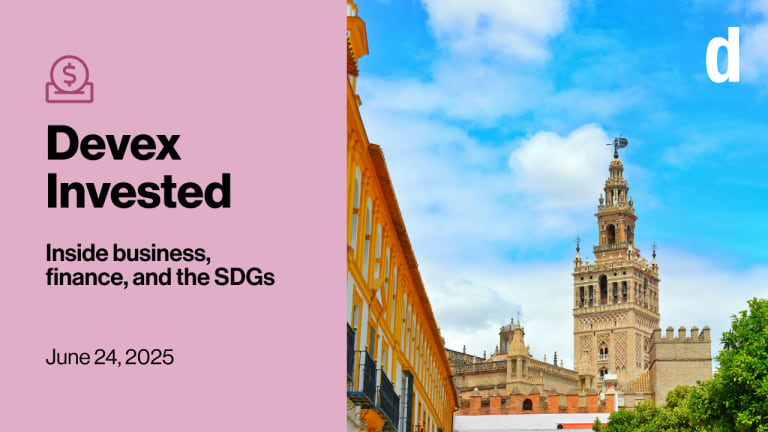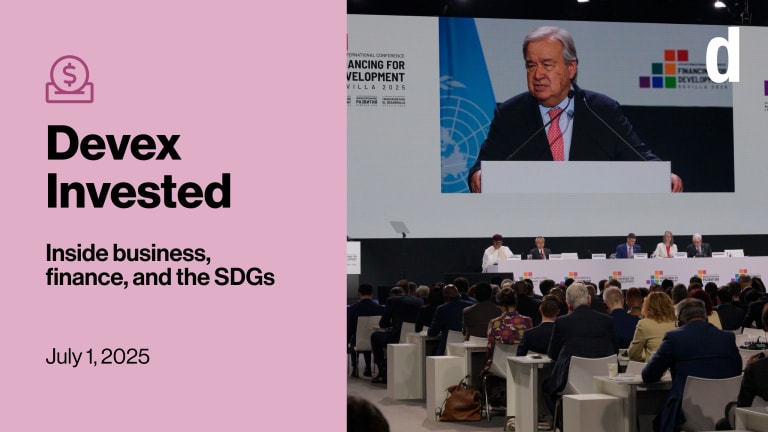Presented by Building Bridges

From Brazil to Baku, multilateralism is taking another stab at solving the planet’s biggest problems this week. Giant leaps or baby steps? Let’s find out.
First, to Rio de Janeiro, where my colleague Elissa Miolene has the latest on efforts to reform multilateral development banks.
This is a preview of Devex Invested
Sign up to this weekly newsletter to get the insider brief on business, finance, and the SDGs in your inbox every Tuesday.
National leaders endorsed a road map on Monday with 12 short- and medium-term recommendations and 44 actions designed to make institutions such as the World Bank “better, bigger and more effective.”
Much of the content is familiar, from exploring instruments such as hybrid capital to harmonizing standards to streamline processes for borrowers. But …
“Part of what makes the road map unique is that it represents the first G20-owned vision for the MDB reform agenda, where previous recommendations originated from expert groups or external reports rather than a negotiated agreement,” Elissa writes, along with my colleague Adva Saldinger. “And unlike a communiqué, it is an agreed-upon plan of action.”
Ilan Goldfajn, the president of the Inter-American Development Bank, told Devex that one of the hardest issues will continue to be scaling up local currency lending.
The big question now, as ever, is whether South Africa will keep up the momentum under its Group of 20 presidency next year.
The timeline is there — 26 of the actions should be implemented within three years, and the rest within six years — but South Africa still needs to establish a monitoring and reporting framework for the road map.
Read: What’s in the G20 road map to transform multilateral development banks?
Keeping receipts
We reported on an early draft of the road map in July, and it’s always fun (no, really) to compare how the language has changed.
Take the controversial issue of whether, despite all the talk of stretching their existing balance sheets, MDBs really need a massive injection of new capital. An expert group convened by the India’s G20 presidency last year called that “inescapable.”
The draft road map floated the prospect of a “medium-term MDB’s board discussion on whether additional capacity (through capital increase, or other instruments like hybrid capital or portfolio guarantee) may be needed …”
By contrast, the final version said that “regular MDB-led reviews of the MDB strategies and the alignment between resources and strategies … would lay a solid basis for MDB’s Boards consideration on whether and when additional capital may be needed or not.”
Your guess is as good as ours on what that will mean in practice, but it doesn’t sound very “inescapable” to us.
Background reading: G20 experts urge 'inescapable' capital increase for MDBs (Pro)
+ Not yet a Devex Pro member? Start your 15-day free trial today to access all our exclusive reporting and analyses, data-driven funding insights, members-only events, the world’s largest global development job board, and more. Check out all the exclusive content available to you.
Hungry for change
Monday also saw the formal launch of the Global Alliance Against Hunger and Poverty, designed to connect countries with the policies, partnerships, and resources they need to end hunger. Elissa has the details here.
We’ll keep an eye on this one, as the G20 does have form on launching food security initiatives that then struggle for momentum — here’s a 2010 press release for perspective on the launch of the Global Agriculture and Food Security Program, or GAFSP.
Read: Brazil launches a G20 plan to slash hunger across the world
Reporter's notebook: On the ground for Rio's G20 summit
IDA bank
The G20 also saw the United States announce (in a closed session) its contribution to the World Bank’s International Development Association fund for the poorest countries.
U.S. President Joe Biden pledged $4 billion, Reuters reported — about 14.3% higher than the United States’ IDA contribution in 2021.
South Korea also announced a 45% increase in its contribution this time around, while Norway pledged a 50% increase.
The view from Baku
Meanwhile, in Azerbaijan, my colleague Jesse Chase-Lubitz has the latest at the halfway mark of the U.N. Climate Change Conference.
Week 2 is meant to be reserved for only the trickiest issues, but for now, all the big issues are still in play, Jesse writes.
Delegates are discussing creating subgoals for adaptation, mitigation, and loss and damage funding, but Debbie Hillier, UNFCCC policy lead at Mercy Corps, said she’s “not very hopeful” that idea will survive the week.
The main game remains the new collective quantified goal, or NCQG — the new global climate finance target that will replace the current $100 billion annual figure. But that’s distracting attention from the loss and damage fund (launched last year) and the Adaptation Fund, a 23-year-old body with a $300 million annual goal, but which has so far secured nowhere near that from donors.
As Devex President and Editor-in-Chief Raj Kumar wrote from Baku: “There’s the Loss and Damage Fund (created at COP27), the Adaptation Fund, the Climate Investment Fund, the Global Environment Facility, and the Green Climate Fund. Even as we raise the funding ambition, does this architecture make sense?”
COP29 special edition: Halfway through the summit, here’s what you need to know
Background reading:
• COP29 is the ‘finance COP.’ Here's what that means (Pro)
• Lessons from the $100B target can shape the next climate finance goal (Pro)
• At COP29 climate finance negotiations, a focus on quality matters.
One big number
$1 trillion
—That’s the ballpark everyone from the World Economic Forum to the World Wildlife Fund is calling for as the new climate finance target.
“There's a growing consensus that's kind of a number that we should work on,” Ani Dasgupta, president and CEO of the World Resources Institute, told Raj at the negotiations. “The discussion here that is going on is, what is the commitment by richer countries to the core of it?”
Read: World Resources Institute chief reflects on the nuances of COP29
Listen: At COP29, leaders push for adaptation funding amid rising climate risks
For your diary
As the world's biggest bilateral donor, USAID spends billions of dollars on contracts every year. If you're looking to get your foot in the door as a USAID partner or grow your business with the agency, we have an upcoming event for you. We'll be hearing from Mike Shanley, CEO of Konektid International, who has many years of experience in helping organizations win USAID funding.
+ Save your spot now for How to win more business with USAID on Dec. 2. This is a free members-only event for Devex Pro subscribers. Not a Pro member yet? You can sign up for a free trial when registering for this event.
Your next job?
Investment Associate / Officer — Global Health
Value for Good
Luxembourg | Belgium
What we’re reading
Ed Sheeran says he wishes he wasn't on the new Christmas song by the Band Aid charity. [BBC]
Saudi Arabia, the world’s top oil exporter, is a “wrecking ball” in global climate talks as it obstructs any agreement renewing a pledge to transition away from fossil fuels. [New York Times]
Anne Beathe Tvinnereim, Norway’s development minister, spoke with Devex about the erosion of trust, development finance, and the importance of food security. [Devex Pro]




